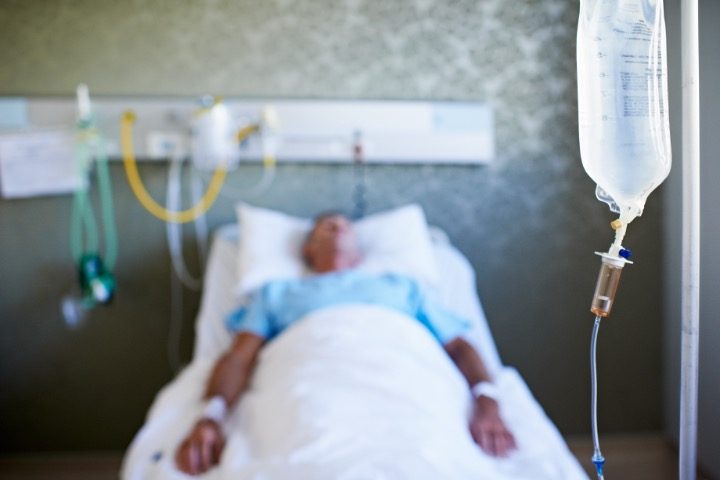
A U.K. medical board has closed a case brought against a doctor who tried to save a man’s life while the medical establishment starved him to death.
The Rev. Dr. Patrick Pullicino, a 74-year-old consulting neurologist who is also a Catholic priest, was investigated by the General Medical Council (GMC) on the basis of a single complaint by, in his words, “a militant ‘Right to Die’ campaigner with an agenda to attack, discredit and caricature [his] medical opinion.”
The complaint stemmed from a 2020 case in which doctors at Plymouth Hospital obtained a court order to stop feeding and hydrating a middle-aged Polish man, known as RS in court documents, who had suffered brain damage after a November heart attack. The doctors argued that, while RS might live for several more years, he would never become more than “minimally conscious” and thus should not be kept alive. Justice Cohen of the Court of Protection concurred, finding that death by starvation was in RS’s “best interests.”
According to Christian Concern:
On Christmas Eve 2020 the hospital informed the family that nutrition and fluids had been withdrawn. Messages begging doctors to continue hydration until RS’s mother arrived from Poland were left unanswered.
On Christmas Day 2020, RS’s sister and niece were allowed a 30-minutes farewell visit to see RS in hospital. They said they were astonished to see how much his awareness had improved over three weeks since they last saw him. When he saw his sister and niece, he appeared to recognize them and began to cry.
It was for that visit that the family urgently sought independent medical advice from Dr. Pullicino.
Based on the family’s description of RS’s condition, Pullicino formed the opinion that RS was recovering faster than expected and should undergo further tests and examinations.
The family applied to the Court of Protection to restore RS’s food and water and to allow Pullicino to conduct a remote examination of him.
During a December 28 emergency hearing, Pullicino told the court that medical journals “suggested that patients making a similar recovery so soon after suffering a hypoxic brain injury had a 50% chance of recovering to the point of achieving independence within their home,” reported Christian Concern. Justice Holman then suspended the order to withhold food and water from RS pending consideration of new evidence.
Two days later, however, Cohen “agreed with the treating doctor’s opinion, and strongly criticized the contrary opinion of Dr. Pullicino and refused permission to instruct him as an expert,” wrote Christian Concern.
In January, the Polish government made extraordinary efforts to save RS’s life, including giving him diplomatic status so that the Polish embassy in London could visit him and arrange for an independent examination. In addition, a Polish court appointed RS’s sister as his guardian and ordered him to be repatriated for treatment.
But Plymouth Hospital and the Court of Protection, bound and determined to do away with RS, joined forces to prohibit Polish authorities from getting anywhere near him. Consequently, RS died of dehydration and starvation on January 26, 2021.
Pullicino had already earned the ire of the pro-euthanasia crowd by sounding the alarm over the National Health Service’s (NHS) Liverpool Care Pathway (LCP), an end-of-life protocol that he claimed in 2012 was unnecessarily killing as many as 130,000 elderly patients a year. Two years later, thanks in part to his efforts, the LCP was abolished — at least officially.
Therefore, when he stepped into a high-profile case to save a man’s life, he was naturally targeted. Celia Kitzinger, a lesbian, former professor of gender and sexuality at the University of York, and prominent “right-to-die” activist, filed a complaint with the GMC accusing Pullicino of either being “biased” because of his well-known “pro-life views” or being “used as a tool of a religious campaigning group” trying to save RS’s life. Pullicino, she contended, “may have deliberately misdiagnosed the patient in the hope of saving his life.”
Three years later, the GMC finally concluded its investigation of Kitzinger’s complaint with a complete exoneration of Pullicino. The council stated that it had seen no evidence suggesting that Pullicino was incompetent to assess RS’s “level of consciousness,” his medical opinion “was inaccurate,” or “his religious faith or personal beliefs affected his opinion.”
“We conclude that there is no realistic prospect of proving these allegations and they are concluded with no action,” declared the GMC.
“I am relieved and pleased that the GMC has refused to take any further action against me,” Pullicino said in a statement.
“The GMC should never have allowed an investigation to proceed against me, which was so clearly targeted against and based on my religious beliefs,” he argued, adding, “I am concerned that it has taken so long for me to be vindicated and cleared.”
Andrea Williams, chief executive of the Christian Legal Centre, which represented Pullicino, pointed out, “The irony should not escape us that this is a doctor under investigation for actually trying to save a life.”
“The case highlights the growing pressure on medical professionals not to break ranks with their colleagues who had taken a controversial decision to end a patient’s life,” she observed. “In sensitive end-of-life cases, dissenting medical experts risk severe criticism by courts and activists, leading to protracted and stressful investigations by professional regulators…. We need more doctors and experts who are prepared to be fearless in defending the patient’s right to life.”


